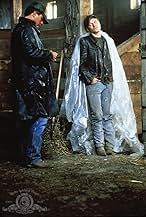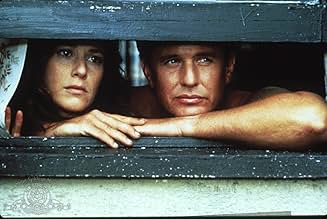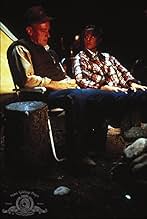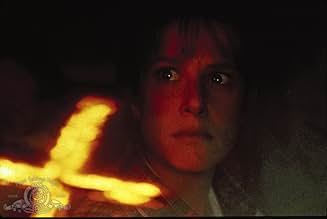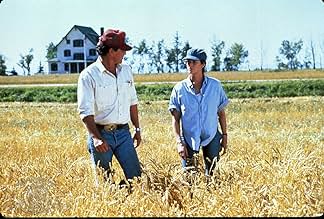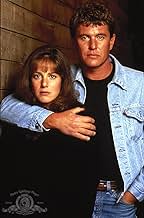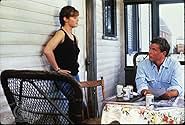AVALIAÇÃO DA IMDb
6,4/10
7,6 mil
SUA AVALIAÇÃO
Adicionar um enredo no seu idiomaAn FBI agent posing as a combine driver becomes romantically involved with a Midwest farmer who lives a double life as a white supremacist.An FBI agent posing as a combine driver becomes romantically involved with a Midwest farmer who lives a double life as a white supremacist.An FBI agent posing as a combine driver becomes romantically involved with a Midwest farmer who lives a double life as a white supremacist.
- Direção
- Roteirista
- Artistas
Avaliações em destaque
Debra Winger plays an FBI agent investigating the death of an obnoxious radio talk show host, but he may have been killed by some white supremacist group. She goes undercover in America's heartland and befriends farmer Tom Berenger, who may have had something to do with the whole thing.
Racism and political beliefs courtesy of Costa-Gavras. Many viewers feel this film completely missed the mark on both accounts. I, on the other hand, have always enjoyed the film very much and think of it mostly as a drama piece, focusing mostly on Berenger's and Winger's relationship. As a suspense flick it also delivers, with high tension especially during the climatic finale. Granted, some scenes are pretty tough to take, but from my point of view this is an excellent study of how many "pure" white folks see the world. They're not depicted here as complete and utter monsters, but regular folks who have radically different worldview than most (I hope).
On the trivia side, Berenger himself said in an interview that this was his favorite among all his films.
Racism and political beliefs courtesy of Costa-Gavras. Many viewers feel this film completely missed the mark on both accounts. I, on the other hand, have always enjoyed the film very much and think of it mostly as a drama piece, focusing mostly on Berenger's and Winger's relationship. As a suspense flick it also delivers, with high tension especially during the climatic finale. Granted, some scenes are pretty tough to take, but from my point of view this is an excellent study of how many "pure" white folks see the world. They're not depicted here as complete and utter monsters, but regular folks who have radically different worldview than most (I hope).
On the trivia side, Berenger himself said in an interview that this was his favorite among all his films.
I found this movie to be effective as both fiction and non-fiction. Debra Winger and Tom Berenger both give first rate performances. This movie reveals how racism is passed down from one generation to the next. The passage, "the sins of the father are visited on the son" seem particularly relevant. I was surprised that it did not receive a higher user rating. Eventhough I saw it years ago, it remains in my memory as a very powerful and important movie.
"Betrayed" is loosely based on the real life murder of a left-wing radio personality by the name of Alan Berg by a white supremacist group called The Order headed by a guy named Robert Mathews. The actual murder happened sometime in the 80s (I believe). In the film Debra Winger is an FBI agent sent undercover to a farming community in rural Illinois to find out information about a possible suspect (Tom Berenger) when a Chicago radio personality is killed.
I've watched this film a number of times over the years. Something keeps pulling me back to it. As someone else mentioned, there are moments that really burn their way into your memory. I can't believe somebody else commented on it, but there is a moment after Tom Berenger's family horse is "put down" and as Bergener and a young Ted Levine are leaving the barn in the rain we see Levine wrapped in plastic holding the gun he used to shoot the horse and walking slightly behind Berenger. For some reason, I've always found the image haunting. Someone else said the image of Levine signifies the devil, which certainly makes sense.
Another moment is when Winger and Berenger are watching through a window as the combine girls leave the motel and the entire scene is played out with the camera outside, and something is blocking the lower part of Berenger's face, so all we see throughout the scene are his eyes. And Winger says, "I don't like people getting hurt". And Berenger says "They aren't people. They're mud people." Something about it is very disturbing and strange.
The racial tirades in the film are quite jarring, too. Especially when the kids say them. The ugliness and hatred of the words contrasts so sharply with the obvious innocence of the children. We see so clearly that the children are not inherently bad, and are simply being taught hatred, as someone would teach a child the alphabet.
The hunting scene, as almost every reviewer has mentioned, is very disturbing, and is clearly meant to be disturbing. I still have trouble watching it.
I do think this is an important film, however. Most films depict the Aryan nation and similar groups as quite simply evil, without offering any kind of logic or shape to what they are about. Betrayed is a film that actually dares to show them as real people. The character of Shorty, played by John Mahoney is a brilliant creation and his campfire speech to Debra Winger, explaining his motivation for behaving like he does, is extremely important for anyone who wants to learn why some people would join a radical group.
Incidentally, there is also a (very disturbing) play entitled "God's Country" that is about the Alan Berg murder and Robert Mathews. And the Oliver Stone film "Talk Radio" is loosely based on Alan Berg's life and murder.
I've watched this film a number of times over the years. Something keeps pulling me back to it. As someone else mentioned, there are moments that really burn their way into your memory. I can't believe somebody else commented on it, but there is a moment after Tom Berenger's family horse is "put down" and as Bergener and a young Ted Levine are leaving the barn in the rain we see Levine wrapped in plastic holding the gun he used to shoot the horse and walking slightly behind Berenger. For some reason, I've always found the image haunting. Someone else said the image of Levine signifies the devil, which certainly makes sense.
Another moment is when Winger and Berenger are watching through a window as the combine girls leave the motel and the entire scene is played out with the camera outside, and something is blocking the lower part of Berenger's face, so all we see throughout the scene are his eyes. And Winger says, "I don't like people getting hurt". And Berenger says "They aren't people. They're mud people." Something about it is very disturbing and strange.
The racial tirades in the film are quite jarring, too. Especially when the kids say them. The ugliness and hatred of the words contrasts so sharply with the obvious innocence of the children. We see so clearly that the children are not inherently bad, and are simply being taught hatred, as someone would teach a child the alphabet.
The hunting scene, as almost every reviewer has mentioned, is very disturbing, and is clearly meant to be disturbing. I still have trouble watching it.
I do think this is an important film, however. Most films depict the Aryan nation and similar groups as quite simply evil, without offering any kind of logic or shape to what they are about. Betrayed is a film that actually dares to show them as real people. The character of Shorty, played by John Mahoney is a brilliant creation and his campfire speech to Debra Winger, explaining his motivation for behaving like he does, is extremely important for anyone who wants to learn why some people would join a radical group.
Incidentally, there is also a (very disturbing) play entitled "God's Country" that is about the Alan Berg murder and Robert Mathews. And the Oliver Stone film "Talk Radio" is loosely based on Alan Berg's life and murder.
If you found American History X powerful, check this out. This movie walks the fine line between fiction and reality, in that it starts out with a portrayal of the murder of the Jewish talk show host in Denver, a real life event, by racist extremists. This is a movie that is especially relevant now , with the upsurge of white supremacist groups. The acting is good; the content is chilling and sobering.
At a crucial moment in the movie, the racist militia group that is the focus of the movie robs a bank, and one of their own are killed by an FBI agent. When asked shortly thereafter how he felt about the killing, the agent says that it was no more than wiping dirt off of his shoe. We often like to think of those people who engage in hatred and violence as being completely "unhuman". We want to believe that they are without emotions, without humanity, without integrity and mostly without love. In short, we want to believe that those with monstrous attitudes are only monsters and nothing else. And it is not so, which is I think the point of "Betrayed". People who adhere to what mainstream society judges as dangerous prejudices are in fact much more complex and often have more of humanity than we would like to believe.
The story centers around two characters: Gary Simmons, played with much tact and depth by Tom Berenger, a leader of a local white supremacist militia group, and Catherine Weaver, alias Katie Phillips (played with complete believability and subtleness by Debra Winger), the FBI Agent who infiltrates the group. Her goal: to link Simmons and his group with the slaying of a leftist shock-jock who is slain at the beginning of the film, an incident which closely resembles the real-life assassination of Denver radio talk show host Alan Berg, a leftist personality known for hanging up on callers and other on-the-air rudeness. (In real life he was the most popular and simultaneously the most hated radio host in his geographic area.) The FBI also wants to undercover any future plans the group may be concocting that might involve assassinating celebrities and/or politicians.
At first, Phillips believes the FBI have targeted the wrong people since despite their use of the N-word and occasional racist jokes, they appear to be peaceful friendly and neighborly, they appear to respect women, and they often give a helping hand to those in need. Gary Simmons is a loyal father, a model citizen who speaks his mind, a hard-worker, and a straight-shooter. He always tries to do the right thing. He is low key and doesn't speak often about his political views. And Phillips also finds herself quite taken with his two beautiful children who are innocent while simultaneously being indoctrinated with prejudice that may manifest itself later as hate and violence. To add to the confusion, Phillips finds herself falling for Simmons, wanting to believe that he is the wrong man.
But as Phillips sinks deeper into the family and friends of those around Simmons, she learns she is very wrong. After Simmons takes her "hunting", a deadly game in which a captured African-American is then hunted by a group of whites like a British Fox Hunt with automatic weapons, she realizes there is more to this group than her initial observations would indicate. Then a camping trip reveals that it is true, that Simmons and his close associates are members of a complex supremacist group with connections all over the country to people who believe that Jews, African-Americans, Gays, and Lesbians, and almost any other non-white ethnic group are intending to exterminate their livelihoods if not their lives. They have rationalized that they have to fight back. And these groups are their targets for not only hatred but for proposed violent engagements.
Phillips' other world is her FBI associates that keep pushing her to stay the course and complete her mission by staying within the family. Unlike her mid-west "family", the FBI team are emotionless, less sympathetic to the traumatic toll the assignment is taking on Phillips, and rather cold about what they are really doing. The government agents have little understanding that despite racists' destructive attitudes, they are real people who love, who grieve, and want happiness. While the FBI wants to put the racists into a convenient stereotypical box, Phillips realizes there is much more to these people than their hate. But she does find that their flawed perception of reality lies within a complex myriad of rationalizations that serve to construct their world-view. They have convinced themselves that only their hate and violence can save them.
The movie becomes a struggle between these two worlds, and at one point, Phillips begins to question which side is the "good" side, and ultimately she must make a choice between the two. The irony is that if we want to "fight" prejudice we can't "fight" the people, as it only fuels the next generation of racists and proves their point. Maybe we can't even fight the attitudes. Maybe we need to love them despite their attitudes and maybe that would foster more love as it appears that hate only breeds more hate regardless of which side we are on.
The story centers around two characters: Gary Simmons, played with much tact and depth by Tom Berenger, a leader of a local white supremacist militia group, and Catherine Weaver, alias Katie Phillips (played with complete believability and subtleness by Debra Winger), the FBI Agent who infiltrates the group. Her goal: to link Simmons and his group with the slaying of a leftist shock-jock who is slain at the beginning of the film, an incident which closely resembles the real-life assassination of Denver radio talk show host Alan Berg, a leftist personality known for hanging up on callers and other on-the-air rudeness. (In real life he was the most popular and simultaneously the most hated radio host in his geographic area.) The FBI also wants to undercover any future plans the group may be concocting that might involve assassinating celebrities and/or politicians.
At first, Phillips believes the FBI have targeted the wrong people since despite their use of the N-word and occasional racist jokes, they appear to be peaceful friendly and neighborly, they appear to respect women, and they often give a helping hand to those in need. Gary Simmons is a loyal father, a model citizen who speaks his mind, a hard-worker, and a straight-shooter. He always tries to do the right thing. He is low key and doesn't speak often about his political views. And Phillips also finds herself quite taken with his two beautiful children who are innocent while simultaneously being indoctrinated with prejudice that may manifest itself later as hate and violence. To add to the confusion, Phillips finds herself falling for Simmons, wanting to believe that he is the wrong man.
But as Phillips sinks deeper into the family and friends of those around Simmons, she learns she is very wrong. After Simmons takes her "hunting", a deadly game in which a captured African-American is then hunted by a group of whites like a British Fox Hunt with automatic weapons, she realizes there is more to this group than her initial observations would indicate. Then a camping trip reveals that it is true, that Simmons and his close associates are members of a complex supremacist group with connections all over the country to people who believe that Jews, African-Americans, Gays, and Lesbians, and almost any other non-white ethnic group are intending to exterminate their livelihoods if not their lives. They have rationalized that they have to fight back. And these groups are their targets for not only hatred but for proposed violent engagements.
Phillips' other world is her FBI associates that keep pushing her to stay the course and complete her mission by staying within the family. Unlike her mid-west "family", the FBI team are emotionless, less sympathetic to the traumatic toll the assignment is taking on Phillips, and rather cold about what they are really doing. The government agents have little understanding that despite racists' destructive attitudes, they are real people who love, who grieve, and want happiness. While the FBI wants to put the racists into a convenient stereotypical box, Phillips realizes there is much more to these people than their hate. But she does find that their flawed perception of reality lies within a complex myriad of rationalizations that serve to construct their world-view. They have convinced themselves that only their hate and violence can save them.
The movie becomes a struggle between these two worlds, and at one point, Phillips begins to question which side is the "good" side, and ultimately she must make a choice between the two. The irony is that if we want to "fight" prejudice we can't "fight" the people, as it only fuels the next generation of racists and proves their point. Maybe we can't even fight the attitudes. Maybe we need to love them despite their attitudes and maybe that would foster more love as it appears that hate only breeds more hate regardless of which side we are on.
Você sabia?
- CuriosidadesTom Berenger's favorite film of the ones he has been in.
- Erros de gravaçãoReversed footage: As the family arrives to the camp site, smoke falls downwards from the sky to the torches.
- Citações
Gary Simmons: [after the murder of a black man] Come on, Katie. Come on now. Just a nigger. Don't make too much out of it. There's plenty more where he came from.
Principais escolhas
Faça login para avaliar e ver a lista de recomendações personalizadas
- How long is Betrayed?Fornecido pela Alexa
Detalhes
- Data de lançamento
- Países de origem
- Idioma
- Também conhecido como
- Summer Lightning
- Locações de filme
- Empresas de produção
- Consulte mais créditos da empresa na IMDbPro
Bilheteria
- Orçamento
- US$ 19.000.000 (estimativa)
- Faturamento bruto nos EUA e Canadá
- US$ 25.816.139
- Fim de semana de estreia nos EUA e Canadá
- US$ 5.534.787
- 28 de ago. de 1988
- Faturamento bruto mundial
- US$ 25.816.139
- Tempo de duração
- 2 h 7 min(127 min)
- Cor
- Mixagem de som
- Proporção
- 1.85 : 1
Contribua para esta página
Sugerir uma alteração ou adicionar conteúdo ausente


